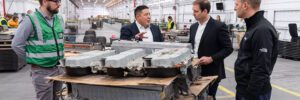
Redwood Materials, the battery recycling company founded by Tesla co-founder JB Straubel, is focused on two of the most critical battery components: cathode active materials (CAM) and anode copper foil. Together, these two components account for the majority of the cost of a battery cell, the company explains, and at the moment, they are produced entirely outside of the US. Redwood’s aim is to produce these components in the US, from an ever-increasing amount of recycled content.
Now Toyota has agreed to source Redwood’s CAM and anode copper foil to use in battery production at the automaker’s North Carolina battery manufacturing plant currently under construction. Toyota is investing nearly $14 billion in the new facility, where the automaker plans to make battery packs for both EVs and plug-in hybrids starting in 2025.
Redwood and Toyota began working together to build a closed-loop battery ecosystem in 2022. Initially, the agreement focused on the collection, testing and recycling of batteries from Toyota’s hybrid vehicles. “Building on our work with Toyota, we will [now] recycle their EVs and hybrid vehicles to help source metals that will build these components that will eventually end up back in their new vehicles,” says Redwood.
For Toyota’s products, Redwood is targeting a minimum of 20% recycled nickel, 20% recycled lithium, and 50% recycled cobalt in the cathode; and 100% recycled copper in the anode copper foil. The company’s large-scale sources of domestic materials will be produced from as many recycled batteries as available, but will also need to be augmented with sustainably mined material.
Redwood is making major investments to build a US supply chain for battery components. Over the next few years, the company will be spending “billions of dollars” to scale its technology and facilities. Redwood continues to expand its Nevada facility, and will soon break ground on a second Battery Materials Campus near Charleston, South Carolina. Both of Redwood’s campuses will recycle, refine and manufacture battery materials, and the company aims to scale production to 100 GWh worth of components annually.
Redwood hasn’t disclosed financial terms of the long-term contract with Toyota, but it’s “significant and important for us,” Straubel told Forbes. “It’s our first end-to-end [automaker] supply agreement, and the most interesting, newest part of this is it’s the first time as far as we’re aware that a major [automaker] has gone all the way from recycling back to component procurement.”
“Accelerating our recycling efforts and domestic component procurement gets us closer to our ultimate goal of creating a closed-loop battery ecosystem that will become increasingly important as we add more vehicles with batteries to roads across North America,” Christopher Yang, Toyota North America’s Group Vice President, told Forbes.
from Charged EVs https://ift.tt/o0byCLA


No comments:
Post a Comment